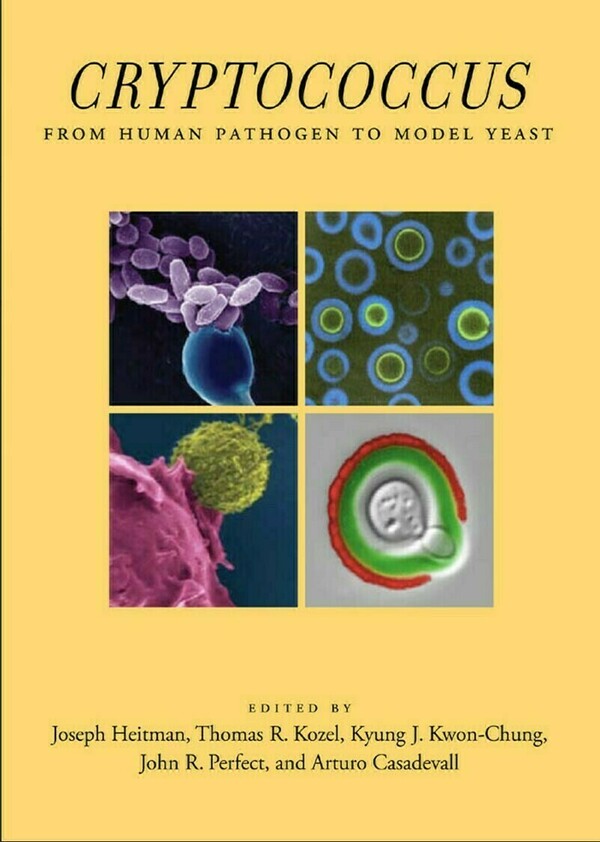Lab Resources
Lab Google Drive

We have a lab Google Drive where each member has a folder. Please use this folder to upload WIPs and Big Update presentations, and any other useful material for your particular work.
In there you will also find a copy of the current lab meeting schedule, protocols, and even a copy of the Cryptococcus eBook (cover image on the right).
Software available to the lab
Graduate students have access to certain software free from the University's portal (also accessed from InsideND). This includes titles such as Adobe Reader, Desktop Box, Microsoft Office, and Zoom.
Other software that may be nessesary (project-specific) can be obtained through Felipe. If you need any of the titles below, please let Felipe know.
- Adobe Photoshop
- GraphPad Prism
- FlowJo
- BioRender
- EndNote
Lastly, these are free and widely-available software that are useful in our lab and can be downloaded from the links below:
- ImageJ (Fiji) - can be dowmloaded here
- Image Studio (for usage of the Licor Odyssey system) - see Felipe
- Image Lab (for usage of the Bio-Rad Gel Doc) - see Felipe
- ApE (A plasmid Editor) that can be found here
- Unipro UNIGENE, to build consensus sequences from a series of chromatograph files (trace files), can be found here
Quartzy lab management system
To mantain an inventory of all consumable items in the lab, and to facilitate ordering, every lab member is asked to make a Quartzy account here. [Update 1/10/2024] We just confirmed that Quartzy accounts are still free! Please see Felipe or any lab members for a walkthrough of how to place requests in Quarzty, look for an item, or create a box or primers, cell stocks, etc.
Relevant conferences for the lab
These are scientific conferences that we regularly attend:
- ASM Microbe - this is a yearly meeting from the American Society for Microbiology; for general information, check here.
- Gordon Research Conference (GRC) on Cellular and Molecular Fungal Biology - this happens every other year; for information on the 2024 meeting, check here.
- CSHL's Microbial Pathogenesis & Host Response Meeting - this happens every other year; for information on the 2023 meeting, check here.
- Midwest Neglected Infectious Diseases (MNID) Meeting - a regional meeting that always happens mid-August. In 2024 it will be hosted by the University of Michigan Medical School at Ann Arbor.
- Midwest Microbial Pathogenesis Conference (MMPC) - a regional meeting that always happens in late September/early October. For information on the 2023 meeting, check here.
Other meetings that we may attend on a case-by-case basis:
- GRC on The Immunology of Fungal Infections - this happens every other year; for information on the 2023 meeting, check here.
- Microbiology Society's Candida and Candidiasis Meeting - this happens every three years, for information on the 2023 meeting, check here.
-
The International Conference on Cryptococcus & Cryptococcosis - this happens every three years, for information on the upcoming meeting in 2026, check here.
Other lab opportunities
-
ABRCMS (Annual Biomedical Research Conference for Minority Students) - originally established for underrepresented minorities, now this meeting has grown to become the largest meeting for undergraduate and postbaccalaureate students in STEM. For more information check here.
- SACNAS (Society for the Advancement of Chicanos/Hispanics and Native Americans in Science) - originally established to address the paucity of Chicano and Native Americans in academia, now this meeting has grown to include all ethnicities. Its mission is to provide the support people of any color may need in order to advance in their fields, such that STEM fields reflect the demographics of our country. For more information check here.
- As of December 2023, I provided students at the university a letter in support of creating a SACNAS chapter. Please check back later in 2024 for more info.
- MBL's MOMY (Molecular Mycology) advanced research course - this course has been training medical mycologist for almost 30 years, and it is seen as a steping stone in the career of almost all current medical mycology researchers. For information on the 2024 course, check here.
Useful links
- To submit a chemical waste pick-up (such as agarose gels or chloroform/phenol) click here. For the agarose gel bucket, say you need a 5 gal bucket replacement. see Felipe if you have questions.
- To submit a biohazardous waste pick-up (like for sharps containers) click here. In the form you need to enter the container size, and then print out the form. The printed form needs to be attached to the container and be visible.
- To log-in into iLab (for core services) click here. New members need to be added to iLab by Felipe before they can log-in.
- To submit a request to reserve a room in Galvin click here. You can also ask Dani (dcortez2@nd.edu) in the office dirrectly.
- To look for a chemical's SDS, you can search the university's SDS binder here. Also, most chemicals in Quartzy have an SDS attached to their entry, albeit it might not be the most updated version. In case of an internet outage, there is a folder in the lab workstation with some SDSs (Felipe updates that folder at least once yearly).